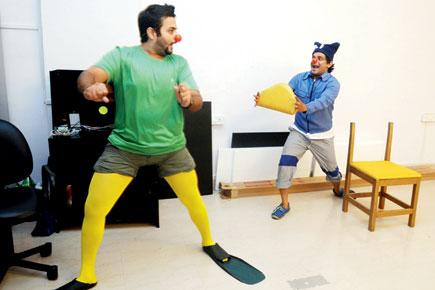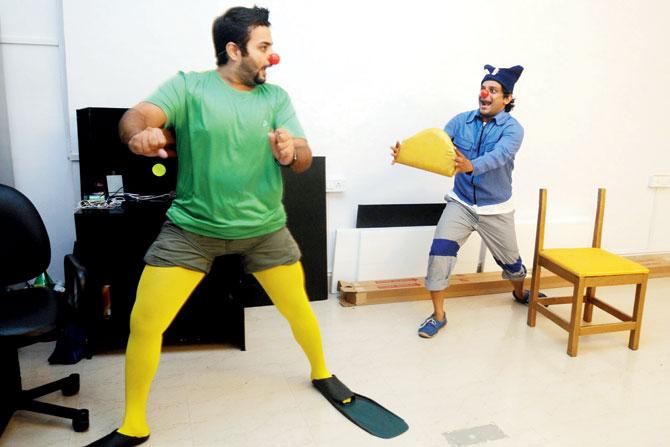Rupesh Tillu and Deepal Doshi are out to tickle your funny bone, and they are damn serious about it!

Clown Popo (played by Rupesh Tillu) and the Frog King (played by Deepal Doshi) are both victims of urbanisation. Their houses and families have been destroyed and they are forced to share a makeshift hammock. Will they ever find a new home or live a life of vagabonds forever?
ADVERTISEMENT

Deepal Doshi (left) and Rupesh Tillu (right)rehearse for their upcoming play, The Clowns, which will be staged at Prithvi Theatre this Tuesday and Wednesday at 12 noon and 4 pm. For details log on to bookmyshow.com. PIC/nimesh dave
To find out, all you need to do is head to Prithvi Theatre this Tuesday or Wednesday and catch a show of TheatreAct’s The Clowns. But before they put on their red nose, we catch up with the duo at their Andheri studio to talk about the serious business of comedy. Excerpts:
Q. Both of you are trained in Physical Theatre. Do you think formal education gives you an edge over artistes who learn on the job?
Rupesh: Some people tell funny jokes and some people are funny. Our attempt is to be those funny people. Education gives you the platform, it helps you to analyse with a method. Without education, you can make a bridge but you yourself wouldn’t be too sure to stand on it. Education gives you that faith and confidence. During our training, we got ample chance to make mistakes and learn from those.
Deepal: We already know 80 ways that won’t work, which we won’t repeat as professionals. There is a science behind everything. And you need to know that to analyse a situation objectively as well as subjectively and create a new objectivity or subjectivity based on that. Even stand-up comedy is based on science — for a joke to work, one needs to have the perfect timing.
Q. What is your take on stand-up acts?
Rupesh: Standup comedy is safer. You know what you are signing up for. There will be jokes you will understand, have a few laughs and go back home happy. In India, stand-up comedy is not as evolved as in the US or in European countries. We, through our acts, are trying to give them a different version of comedy.
Deepal: Stand-ups reflect the society. Although stand-up comedians often resort to crude jokes to extract laughter, the fact that people laugh at those, proves that they serve their purpose. For a comedy to work, the audience is as important as the performer. Without the audience there is no comedy.
Q. Don’t you think that makes the whole business risky as well? What if they don’t react the way you had anticipated?
Deepal: Humour is always at the cost of something. You always laugh at somebody, not with somebody. Even when you are laughing together, you are laughing at some person, event or thing. Laughter is a consequence and not an act.
We, as clowns, undertake a journey and try to be as authentic as we can. The suffering of the clown is what makes the audience laugh. Our goal is not to anticipate laughter but to go through the emotional journey and take the audience along with us. There will always be people who will not like your play. It becomes a point of concern if nobody likes it!
Rupesh: As an artiste, you always know that three out of five people will like the act. The challenge is to engage the rest of the two people. Our job, as artistes, is to strive and make a product that is liked by everybody — even if it is for different reasons. The key is to test your material on a variety of audience.
Q. The Clowns is essentially a children’s play. Is it easier to get kids engaged in a comedy?
Deepal: Although it is easy to amuse kids and make them laugh, it is difficult to keep them engaged. And the thing with kids as your audience is that if they are not engaged in your performance, they are engaged in something else and in that case it becomes a challenge.
Rupesh: But at the same time, kids don’t wear masks, their emotional switch is very fast. They react spontaneously without delving deeper into the cause and effect of things. And in this, they are like the clowns who don’t have a past or a present but live in the moment. Hence it is easier for the clowns to connect with the kids.
However, in India, the prevalent notion is that clowns are just for entertaining kids. And that is what we want to change. In the West there has been a long tradition of fools and clowns who are more than just the midget with a red nose who takes the stumble. We want to bring in newer concepts.
Once we have enough number of practitioners, there is scope for specialisation. Now, the time is ripe in India to experiment with and specialise in various different forms of comedies.
 Subscribe today by clicking the link and stay updated with the latest news!" Click here!
Subscribe today by clicking the link and stay updated with the latest news!" Click here!






